At a Glance: Euphoria
Designer: Jamie Stegmaier, Alan Stone
Publisher: Stonemaier Games
Artist: Jacqui Davis
Editor: Unnamed
Suggested Age: 13+
Playing Time: 60 minutes
Theme: Dystopia, Science Fiction
Mechanics: Worker Placement (using dice), Variable Player Powers
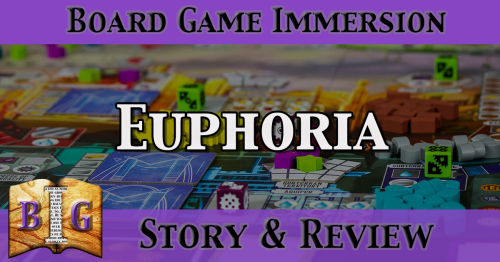
“Even here, in the middle of nowhere, you worry someone might overhear you.“
– Suzanne Collins, The Hunger Games
Intro Story: Something Wrong
Lars was nothing out of the ordinary. He wore the same white shirt and same brown pants as everyone else in his sector, and he went to work everyday with those assigned to his unit. As he walked toward the giant wheels that generated power for the city, he caught up to Jonathan, who was assigned to the wheel next to his own.
“Don’t look over your shoulder,” Jonathan said as Lars fell into step beside him. “But there’s something wrong about this place.”
“Wrong?” Lars wrinkled his brow, trying to think about what could possibly be wrong about their utopian society. The more he thought about it, the more his brain hurt, so he stopped trying.
“Don’t you think it’s odd how they put us in the energy wheels for ten hours a day, every day?”
“Power’s gotta come from somewhere,” Lars said. “Might as well be from us.”
“That’s the other thing,” Jonathan said, glancing over to Lars. “Nobody asks enough questions here. We all just accept our lot and more on.”
“It’s a good lot,” said Lars, smiling. Life was good. Perhaps it was his increased dosage of bliss, the organic compound harvested from the clouds above. Lars had a thought—odd, true, but not unheard of—and turned to look at his comrade. “Are you still taking your doses of bliss?”
Jonathan tripped, but not on anything visible. How could he? The sidewalks and streets were pristine, voice of anything unnecessary, and that included the smallest of pebbles.
“Keep your voice down!” Jonathan hissed. “Do you want to get us arrested? Look, I’m telling you this because I like you, Lars. You’re a good bloke. Now listen. Something isn’t right about this, and I think it’s the bliss keeping us happy with our mundane life.”
Lars laughed, another oddity about him and society in general, but again, not unheard of. “You think life is mundane? What could you possibly want? We have food, shelter, and close. We have our assigned families and work stations. Everything is provided for us!”
“That’s just it,” said Jonathan. “We don’t get a say in anything.”
“Why would we want to?” Lars asked. “That just seems like a lot of responsibility.”
They reached their workplace and Lars hopped into his wheel to begin his shift. It didn’t take much, just walk and walk. And walk. And walk some more. The wheel turned and electricity was generated. It was his job to help provide power.
The next day, Lars didn’t think twice when a new worker climbed into Jonathan’s wheel.
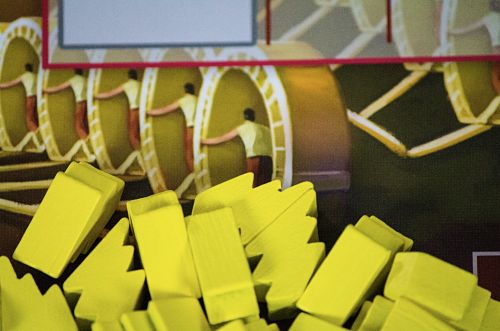
Note: I was provided a complimentary copy of Euphoria for the purpose of review. The thoughts and opinions in this review are my own.
Euphoria Review: Overview/Roadmap
This review has two parts. First, there is the Short Review, where various aspects of the game are discussed. Then comes the Gameplay Review, in which the setup and gameplay are discussed in detail, along with thoughts of the various aspects of the game. Following the Gameplay Review section are some final thoughts and a final verdict of the game. Feel free to jump around, or read it all in one go. The choice is yours.
Short Review
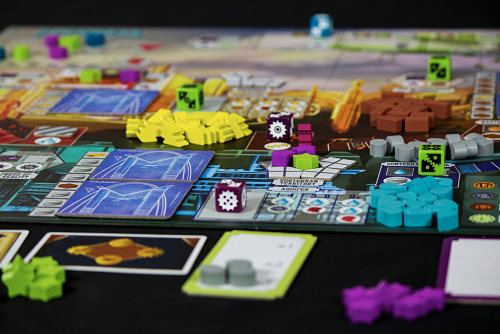
Euphoria is a worker-placement game set in a dystopian future. Your dice are your workers, and the pips represent their knowledge. Like any good dystopia, the dumber your people, the less likely they are to revolt. And so it is with Euphoria; keep your workers happy, but keep them in the dark, because the smarter they get, the greater chance you have of losing one to the infamous “truth.”
Immersion
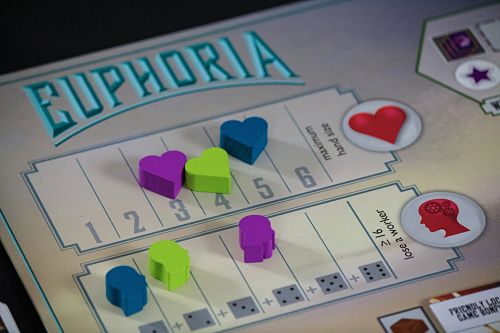
Straight to the point: Euphoria has me hooked each time I play. The theme is engaging, but it’s the gameplay that really sells this one. With multiple ways to place stars (i.e. gain points, kinda), there’s always a lot to look at, not to mention the other players who will try and leave you out of their building endeavors (more on that later).
Theme
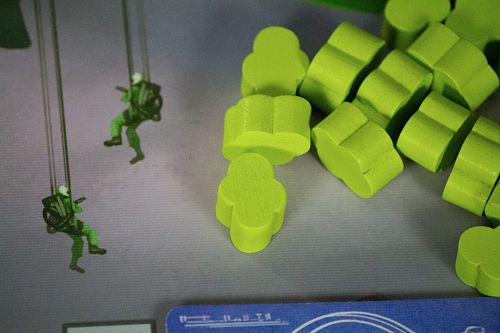
Dystopias are a common theme in young-adult literature. From The Hunger Games to Divergent, there’s always a new take on what could go wrong down the road. While the game’s name—Euphoria—may seem like bliss and cake, it is, in fact, set in a dystopia. Clever of them, really, to name the place Euphoria. Who could see through that?
Everything about Euphoria hearkens back to its theme. The dice—your workers—have collective knowledge, represented by the pips on their face. So, if you get too many workers, they start to talk, and then, inevitably, one runs away and you’re minus one worker. How incorrigible.
It’s things like that—keeping your workers in the dark, if you will—that really add to the theme. Plus, if you increase your workers’ morale, your hand size increases. Nice! So it’s a fun balance of getting what every dystopian dictator wants: small brains and happy hearts.
And, bless their hearts, they even named one of the commodities—the green cloud—“bliss.” If that doesn’t scream dystopia, I don’t know what does.
Components
The components are excellent. The dice have the steampunky gear look to them; the resources and commodities are good, solid wood; the cards are durable; and everything is awesome (insert song here).
Standout Performances

There’s a lot to love about Euphoria! Perhaps the most appealing aspect of the gameplay—at least for me—is balancing my workers’ smarts and their morale. Trying to do too much is always risky, but the rewards can be juicy. Not so much if a worker runs out on you, however.
There is a small area control element to the game as well, and this adds some grey hairs—if you’re not ready for it. I’ll talk about this further on, but essentially, if a market is built, and you didn’t contribute, you gain a harsh penalty. So there’s this aspect of blocking other players out so you can build markets without them. It’s cruel, but it’s a wonderful part of the game.
The dice are really cool. What else do you want?
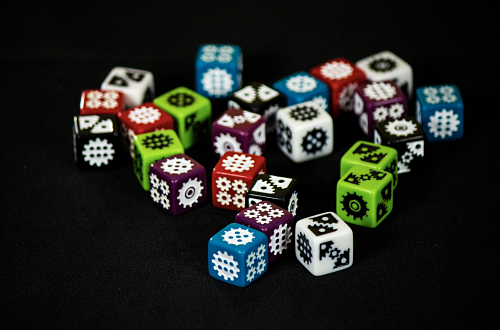
The art is fun and thematically appropriate. From people in hamster wheels (generating electricity, I would assume) to the relics of the past (i.e. teddy bears and baseball bats), everything is a pleasure to look at.
The game isn’t run by points, nor is it won by points. Rather, the first person to place all ten of their stars wins. Of course, it is possible to tie, but with the vast amounts of tie breakers, that’s not likely to happen.
And that’s another thing I appreciate about Euphoria: the tie breakers. A lot of games give one or two tie breakers, then declare that the tied players share the victory is the tie remains. Here, someone is bound to win. I love the thought that went into that.
Breaking the 4th Wall
In theater, breaking the fourth wall refers to when characters (or something else) directly address the audience, thus pulling them out of the narrative and making the astutely aware that they are, in fact, watching a performance and that’s it’s not actually real.
(Otherwise known as, “What took me out of the immersion and/or gameplay?”)
There’s really not a lot in here that keeps me from enjoying the game. Or, rather, that pulls me out of the game. However, there is one thing I’d like to point out: doubles.
If you roll doubles, you are able to place your workers (with matching pips) one after the other, effectively taking multiple turns in a row. While it’s nice being that person, it’s rather obnoxious as the other player who can’t seem to roll doubles for the life of him. It’s kind of based on random chance (ok, not “kind of” at all). However, there is a rule variant that causes you to pay a resource (after your first dice placement) if you have doubles and want to place more. So that helps mitigate that helpless feeling by those of us who are still learning to roll doubles.
This next one isn’t really a bad thing, but something you may want to be aware of. Euphoria excels with lots of players. And then there is the two-player game. Don’t get me wrong, playing with two players is still wonderfully enjoyable, but it does play a bit differently. Instead of jostling for position, it’s more of a race to build the markets before the other player. Then it’s a race to drop your stars. Given, it’s a paced race, so it’s not frantic or anything, but the feeling is a bit different than at more players, including with three players. That said, it’s still a ton of fun at two, just…different-ish.
Gameplay Review
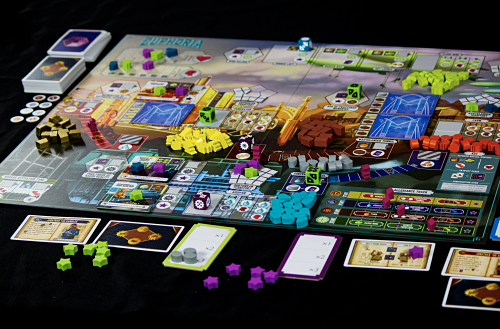
First Impressions
Upon first glance, you might think there’s a lot going on in Euphoria. And there is! Ha ha! But don’t worry; it’s manageable. And, actually, relatively simple to understand, especially after getting one game under your belt. But do be aware that there are tunnels to dig, markets to build, workers to splash awake, and a bunch of other things all vying for your attention. So, yes, it’s a bit much to look at on first glance, but it’s nothing to be frightened of.
You’ll also notice the good component quality (as mentioned above). That’s always a good first impression.
Likewise, the rule book is written in such a way that it’s easy to follow. It answers any questions you might have, and walks you through it hand-in-hand.
Setup
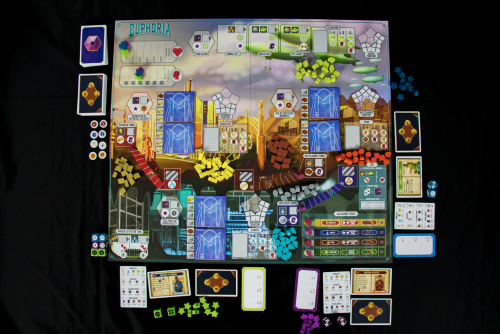
While I won’t tell you how to set up the game (you can discover that on your own), I will say a few things regarding setup.
It’s pretty straightforward.
Basically, put the resources on the board near where it shows you get them, deal a few cards (after shuffling, of course), and you’re pretty much done. It might take a few setups to remember where everything is supposed to go, but it’s a simple process, for which we can all be grateful.
Gameplay
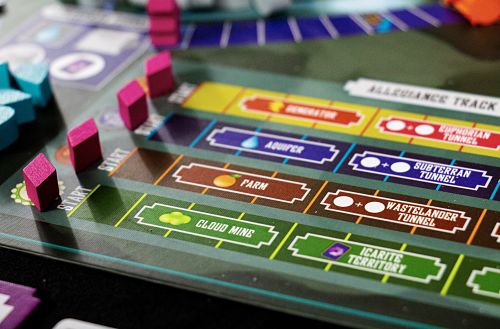
The game goes as such: place a worker die, do the thing associated with that space. The other players take their turns. Place another worker on your next turn. Out of workers? Use your turn to call them all back.
And that’s the game.
Now, obviously there’s a lot more that goes into it, but in essence, your “actions” are pretty straight forward: place a worker, get your workers back, or decide the future of your game by resolving your Ethical Dilemma card (a one-time use).
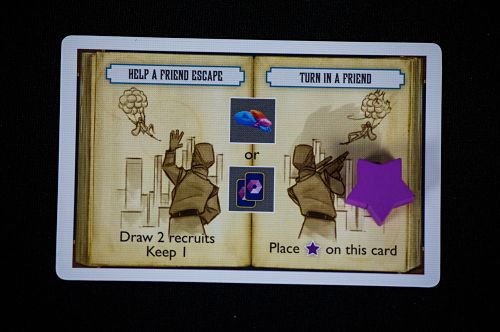
During the game, you’re going to be placing workers to get resources (clay, stone, and gold) or commodities (bliss, food, water, and power/electricity/lightning/etc.). You will then place your workers on spaces to spend those resources/commodities on other things, such as digging a tunnel, getting more workers, or getting other commodities.
It’s a game about trading stuff for stuff and then using said stuff to get other stuff, ultimately placing stars in order to win. That’s the game in a nutshell.

I really enjoy the gameplay experience. Many of the spaces allow players to “bump” you off so they can take that space. You can even bump off your own worker to double dip. It’s good to bump because you get the spot you want, but it’s not so good because the other player gets their worker back without having to spend an entire turn doing so. Give and take.
Some spots, however, do not allow for bumping. These are at the market spaces, and once you’re there, you spend the resource. After a certain amount of players (could be you multiple times, if it makes it that far) have plopped their workers on those spaces of that particular market, the market is built and all those involved place a star. If you didn’t contribute, there’s a negative effect that comes in to haunt you and hinder your game. You can place a star on that market later, but until you do, it’s gonna hurt.
What’s so great about the market spaces is forcing people to play their resources or risk being left out. After all, there are generally more players than required spaces, so chances are one or two players won’t make it. With two players, however, there are two open spots, so it’s possible for both players to contribute every time. That said, when I play two-players, I make sure I’m building on markets where the other player doesn’t have the necessary resources. Because that’s how I am. (Hey, don’t @ me; it’s part of the game!).
Tunnels are another fun aspect. As all players have at least one recruit (i.e. a character card with an ability, which character is associated with one of the four regions), they can use their active recruits to get a lot more resources once the tunnel is complete. Now, if you don’t have the matching recruit, you can’t use that spot. Too bad, so sad. But, while you tunnel, you will also reach a spot that has you flip over (i.e. activate) recruits of that faction. Tunnels are a fun way to play, especially if you see someone else trying to finish the tunnel, you can let them do most of the work. Keep in mind, though, that if it takes too long to tunnel, it probably won’t be worth the end result.
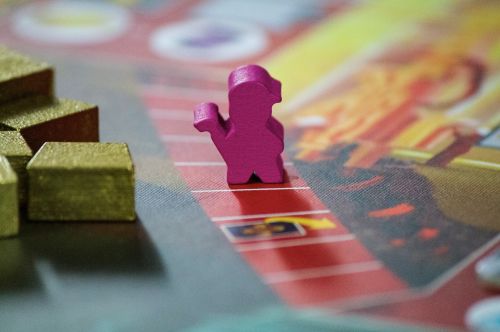
Thoughts on Gameplay
On your first game, expect your turns to take a bit longer than they probably should—that’s normal. There’s a lot to look at, and trying to make sense of what goes where and where goes what can take half a game, at least. For me, it all clicked near the end of the first game, and the next time I played was much better. Fortunately, you’re probably smarter than I am and so will understand it much quicker than I did.
Solo Play
While the base game does not support solo play, the expansion—Ignorance is Bliss—does. Unfortunately, I have not played the expansion, nor do I own it, so I will have to forego any discussion on solo play.
Final Thoughts
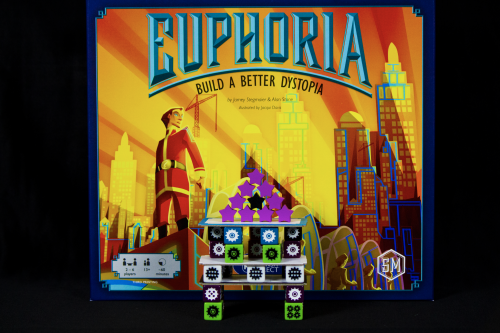
Euphoria is a solid worker-placement game. I am a big fan of worker placement, and while this may not be my most favorite game with that mechanism, it’s certainly up there—especially with 4+ players. Give me solo play and it may just jump up even more.
So yes, I like Euphoria. Quite a bit, actually. It has fun aspects of managing worker smarts (don’t have too many workers!), morale (keep ’em happy!), and resources and commodities. Digging tunnels to get more stuff based on your recruits is a great part of it, and everything plays so well into the theme that I can’t help but get drawn in.
Euphoria: Final Verdict
With so much to love and not that much to talk trash about, Euphoria is more than good. In fact, I give it a rating of Captivating. From components to gameplay and from theme to art, Euphoria is the dystopia all other dystopias wish they could be.
Verdict Scale (Lowest to Highest)
The Final Verdict is based on a scale of 1-7, although this scale is not numbered. Instead, it uses thematically appropriate words to describe the performance of the game.
Tomatoes – This game was emotionally taxing and difficult to finish.
Uninspiring – This game had me daydreaming about other games.
Lackluster – This game had its moments, but it probably won’t see much table time.
Laodicean – This game is decent. It works. There’s a reason people like it.
Two Thumbs Up – This game is very good.
Captivating – This game is outstanding! It’s more than good; it’s practically a staple.
Standing Ovation – This is the best game you will ever play. Period.
Read short fiction inspired by board games at BGI’s stories page!


